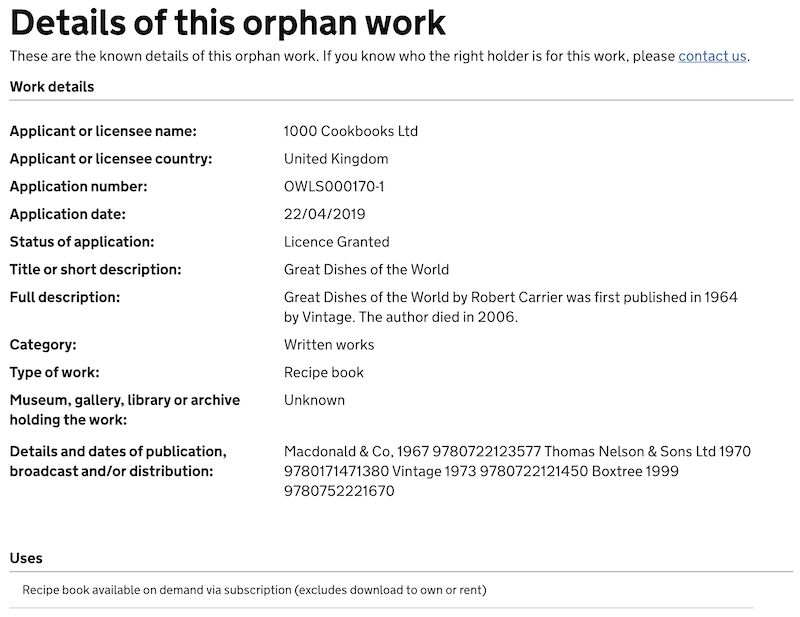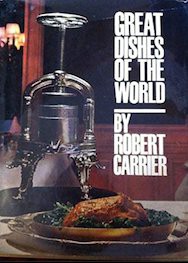Advertisement
Rediscovering Great Dishes of the World
6 June 2019 · ckbk news
ckbk brings together hundreds of the world’s best cookbooks — and we’re just getting started!
Robert Carrier’s Great Dishes of the World is undoubtedly a classic. First published in 1963, it went on to sell more than 10 million copies in numerous editions. According to cookbook editor Jill Norman, “Great Dishes of the World persuaded readers to look beyond their usual culinary boundaries and experiment, inspired by Carrier’s confident and exuberant style.”

Robert Carrier (National Portrait Gallery / Michael Birt)
This week, as part of our mission to bring the world’s best cookbooks online, we are delighted to add Great Dishes of the World to ckbk’s collection of 350+ licensed cookbooks which together include more than 75,000 recipes.
Michelin-starred chef Shaun Hill, who began his career in Robert Carrier’s Islington restaurant, notes that “[Carrier’s] food was unashamedly luxurious with plenty of cream, eggs, butter and wine. The menu included classic dishes from the era’s best French restaurants, and Middle Eastern and North African dishes like Moroccan koftas. It all tasted good in a joyful and exuberant way. Great Dishes of the World was one of his most successful books and is still an inspiring read.”
The book continues to provide inspiration not only through its clearly written recipes, but also through its striking visual style. Originally published as a series of articles for the then newly-launched Sunday Times Colour Magazine, the book’s photography was groundbreaking. Food historian Polly Russell, a big fan of the book, describes the Rhum Baba as ‘nothing less than pornographic’ and the other photos are similarly eye-catching.
Behind the scenes — a licensing adventure…
The team at ckbk has spent thousands of hours researching and licensing the rights necessary to create our “ultimate digital subscription service for cooks”, while ensuring that authors and content owners are fully compensated with royalties. The story behind the licensing of Great Dishes of the World may give some insight into the challenges involved in this process.
The book, long out of print, was most recently published by Macmillan — who are one of ckbk’s licensing partners (so far, so good!). However, Macmillan’s publishing agreement did not include digital rights. Macmillan advised ckbk to contact Carrier’s last agent, Curtis Brown, but with the author having died in 2006, this failed to produce results. Further research, including speaking to a number of Carrier’s friends, led to the realization that, quite simply, no one knew what had happened to the rights when Carrier died (his long term partner having predeceased him).
This situation, referred to as ‘orphan work’ status, is surprisingly common in the book publishing world. While music publishers rely on various shared databases for tracking rights, book publishing has little that is comparable. Copyright lasts for 70 years from the death of the author, but within a decade or two of an author’s death it can become practically impossible to identify the current owner of an author’s literary rights (Matt and Ted Lee’s fruitless research in the run up to their reissue of Princess Pamela’s Soul Food Cookbookis another illustration of the problem).
Fortunately, in 2012, European legislation came to the rescue. The Orphan Works Directive made it possible to formally register an orphan work and obtain a license to use it, if it could be demonstrated that a ‘diligent search’ had been done and all reasonable efforts had been made to identify the rights owner. The UK’s Orphan Works Registry launched in 2014 to implement this directive. When issuing licenses, the Registry collects and holds in trust a commercially reasonable licensing fee so that, if and when the rights owner comes forward, they will be able to claim these royalties.
The path was clear, then? We just needed to register the title as an orphan work. Unfortunately, it wasn’t quite as simple as that. The creators of the UK Orphan Works Registry hadn’t envisioned the growth of digital subscription services when setting up the available licensing models. Adding to the challenge, ckbk planned to offer access at the recipe level rather than requiring users to download the entire book in one go, something else the Registry was not yet ready for.
Undaunted, we worked with the UK Intellectual Property Office to establish an appropriate model, benchmarked against existing digital subscription services such as Kindle Unlimited from Amazon. Kindle Unlimited pays out around $250m in royalties each year, and like ckbk, allocates royalties based on page-by-page usage, providing a helpful precedent.
We were delighted when these efforts finally paid off last month, with the granting of an Orphan Works License for Great Dishes of the World, allowing it to be added to ckbk’s collection. We hope you will enjoy sampling its delights as much as we have.
We continue to work to track down the current owner of Robert Carrier’s cookbook rights. If you can help, please drop us a line: licensing@ckbk.com

The Orphan Works Register entry for Great Dishes of the World
The world’s cuisines are a hugely important part of our global heritage. Food plays a vital role in our health, in our social interactions, and in our national and cultural identities. Until now, great culinary works have received far less attention than the classics in other cultural arenas. ckbk sets out to change this and to bring together all the great dishes of the world — please join us!
In celebration of Great Dishes of the World and our successful licensing journey, ckbk is offering 50% off Premium Membership for one year with code GREATDISHES50. Discount applies for 12 months, cancel any time. Offer valid through Thursday, June 13th, 2019.
ckbk is home to the world’s best cookbooks and recipes from famous name chefs and authors. Start exploring now!
Sign up for ckbk's weekly email newsletter
As an added bonus you will receive a free PDF download featuring recipe highlights from our favorite cookbooksAdvertisement


